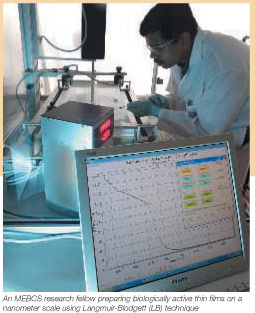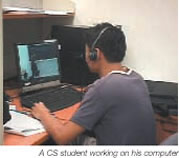|

Molecular Engineering for Biological and Chemical Systems (MEBCS) programme
|
The MEBCS programme aims to give its students a fundamental understanding of biological and chemical sciences as well as the
engineering and design aspects of products and processes. Research encompasses areas such as structured fluids, surface functionalisation, microstructure tailoring and materials design in relation to fine chemical and pharmaceutical syntheses as well as the molecular and cellular aspects of biotechnology and bioprocess engineering. Two proposals which have been internally identified as the flagship projects of MEBCS, and merged together with the research expertise of various MEBCS Fellows have progressed well according to plan. The project on “DNA-Guided Synthesis of Materials”, which received external funding from A*STAR, has delivered its milestone on the DNA-driven programme assembly of Pt group metals. The project on “Signalling Biochips and Microarrays” has resulted in the submission of a PCT on spatially addressable protein capture array.
|
|
 |
Currently, the MEBCS programme has twelve Ph.D. students. Three of them passed their qualifying exams in January 2002 and embarked on their theses in April 2002. The remaining nine passed their qualifying exams in January and April 2003 and embarked on their theses in July 2003.
|
| |
| Computer Science (CS) programme |
The programme-wide research theme is centred on the use of computing technologies to boost the productivity of human endeavours. The aim is to take advantage of the exponentially decreasing cost for disk storage, memory, processing power and camera arrays to capture and store records of human activities such as classroom lectures, scientific collaborations, engineering discussions and corporate meetings. Research in the areas such as graphics, media, artificial intelligence, databases and parallel processing technologies will allow these records to be indexed, organised and stored with minimum hassle. Machine learning technologies allow the appropriate material to be found when required, while graphics and media technologies allow the knowledge to be absorbed quickly by allowing playback at higher speeds, skipping of irrelevant material and viewing of the reconstructed scenes from the best vantage point.The use of 3-D reconstruction technology,
together with the advantage of being able to review the material and play back the appropriate
sections at the appropriate speeds, should make the experience of using the material comparable
to, or better than, actually being present at the event. Networking and grid computing technologies
will allow access, processing, and distribution of the material in a timely manner. The technologies
created can be used in applications such as disaster control and remote management, e-learning,
global collaboration, and knowledge management in organisations. Supporting the research activities
is a pool of fourteen Fellows, eleven research fellows, six research assistants and eight Ph.D.
students.
Collaborative research in the programme centres on multiscale adaptive computing technologies,
especially those that depend on streaming data, which are geographically distributed and can
accommodate heterogeneous environment. The recent events of global impact - terrorism, the
severe acute respiratory syndrome (SARS) outbreak and the rapid sweeping changes in business
and society have painfully demonstrated the vulnerability of computer systems when the
environment changes unexpectedly. The main research objective is to design and build computer
systems that respond intelligently to a changing world, operating under serious resource constraints
when only limited and unreliable information is available. In addition to developing prototype
computer systems to answer this question, the research programme focuses on advanced
application areas with strategic significance to Singapore, such as distance healthcare and distance
education, to ground the systems research.
|
|
|
|
|




